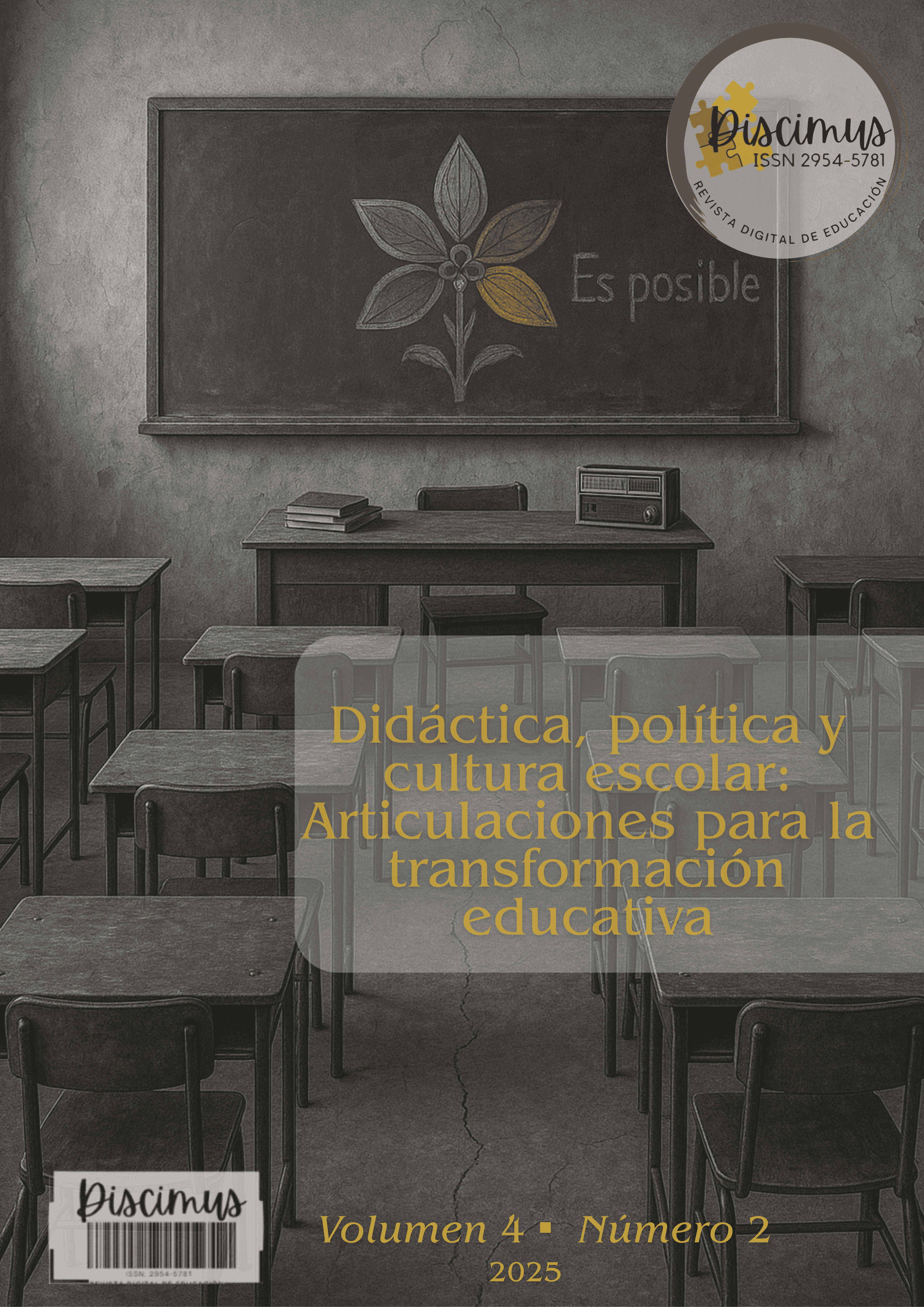Literature and Its Impact on Emotional Self-Regulation: A Performative Ethnographic Study
Main Article Content
Abstract
The present document analyzes the impact of reading short novels on emotional self-regulation and its relationship with context in fifth-grade students at María Auxiliadora Educational Institution (Andes), Palomino Educational Institution (Pinillos), and Alfredo Bonilla Educational Institution (Jamundí).
For this purpose, qualitative instruments with an ethnographic approach were used, prioritizing contextual relationships and evaluative judgments. The theoretical framework was supported by Nussbaum with her theory of moral emotions, Zimmerman with his proposal on self-regulation in educational environments, and Todorov with his postulates on literature and discourse. Based on these, a set of strategies was developed, including an observation guide, performative ethnography, and semi-structured interviews, revealing relationships between emotion and context, where literature acted as a mediation between the subject and perceived stimuli.
In this regard, it is correct to affirm that literature serves as a means to bring forth moral emotions. These emotions arise from the individual's own contexts and influence unconscious manifestations in response to any stimulus.
Downloads
Article Details
Section

This work is licensed under a Creative Commons Attribution-NonCommercial-ShareAlike 4.0 International License.
Open Access Policy at Discimus Journal
Discimus Journal is committed to the promotion of free circulation of scientific and academic knowledge, simultaneously ensuring appropriate acknowledgment for our authors while adhering to the ethical principles of scientific publishing. In alignment with this goal, Discimus publishes all its articles under the ATTRIBUTION-NONCOMMERCIAL-SHAREALIKE 4.0 INTERNATIONAL CC BY-NC-SA 4.0
How to Cite
References
Bisquerra, R. (2008). Educación para la ciudadanía. El enfoque de la educación emocional. Madrid: Wolters Kluwer.
Bisquerra, R., & Molero, D. (2020). Educación emocional en la orientación y tutoría universitaria. En A. Pantoja (Coord.), Buenas prácticas en la tutoría Universitaria (pp. 131-150). Síntesis.
Denzin, N. K. (2003). Performance ethnography: Critical pedagogy and the politics of culture. Thousand Oaks, CA: Sage Publications.
Extremera, N., & Fernández-Berrocal, P. (2004). La inteligencia emocional en el ámbito educativo: Estado de la cuestión. Revista Electrónica de Investigación Psicoeducativa, 2(5), 1–34.
Fernández-Berrocal, Pablo, Cabello, Rosario, Gómez-Leal, Raquel, Gutiérrez-Cobo, María José, & Megías-Robles, Alberto. (2022). Nuevas tendencias en la investigación de la Inteligencia Emocional. Escritos de Psicología (Internet), 15(2), 144-147. Epub 01 de mayo de 2023.https://dx.doi.org/10.24310/espsiescpsi.v15i2.15842
Friere P., (2022). Pedagogía del oprimido. Siglo XXI editores.
Gardner, H., (1993). Multiple intelligences: The theory in practice. Basic Books/Hachette Book Group.
Gutiérrez, R. (2021). Entrevistas estructuradas, semiestructuradas y libres. análisis de contenido. Técnicas de investigación cualitativa en los ámbitos sanitario y sociosanitario, 171 (04). 65-83. Recuperado de: entrevistas estructuradas, semiestructuradas y libres. análisis de contenido (uclm.es).
Hauser, M. D. (2008). La mente moral: Cómo la naturaleza ha desarrollado nuestro sentido del bien y del mal. Paidós Ibérica.
Hernández, R., Fernández, C., & Padrón, M. (2014). Metodología de la investigación. McGraw-Hill.. Recuperado de: Metodología de la Investigación -sampieri- 6ta EDICION.pdf - Google Drive.
Kendall, P. y Wilcox, L. (1979). Self-control in children. Developmental of a tating scale. Journal of Consulting and Clinical Psychology, 47, 1010-1029.
Knuuttila, S. (2004). Emotions in Ancient and Medieval Philosophy. New York: Oxford University Press.
Mejia-Flores, M., Sánchez-Manobanda, K., & Morales-Gómez de la Torre, M., (2023). La educación afectiva para el desarrollo de la inteligencia emocional. 593 Digital Publisher CEIT, 9(1-1), 136 - 147, https://doi.org/10.33386/593dp.2024.1-1.2267.
MELAMED, A. F., (2016). Las teorías de las emociones y su relación con la cognición: un análisis desde la filosofía de la mente. Cuadernos de la Facultad de Humanidades y Ciencias Sociales - Universidad Nacional de Jujuy, (49), 13-38.
MEN. (1998). Lineamientos curriculares de lengua castellana. Bogotá: Ministerio de educación nacional. Recuperado de: lineamientos-curriculares-de-lengua-castellana.pdf (socialhizo.com).
Nussbaum, M. (1996). Aristotle on Emotions and Rational Persuasion. en A. Rorty (ed.), Aristotle´s Rhetoric (pp. 303-323). Berkeley: University of California Press.
Nussbaum, M. (2003). La terapia del deseo: teoría y práctica en la ética helenística. Paidós.
Nussbaum, M. (2008). Paisajes del pensamiento. Paidós.
Nussbaum, M. C. (2001). Las emociones políticas: Por qué el amor es importante para la justicia. Paidós.
Todorov, T (1978). Los géneros del discurso. Waldhuter editores.
Todorov, T. (1994). La conquista de América: El problema del otro. Siglo XXI Editores.
Todorov, T. (2008). Los abusos de la memoria. Paidós.
Todorov. T. (1981). Introducción a la literatura fantástica. Premia editora de libros s.a.
Zimmerman, B. (2000) Attaining self-regulation: a social cognitive perspective. En M. Boakerts, P. Pintrich y M Zeidner (Eds.), Handbook of self-regulation. San Diego, Academic Press, p. 13-39.

